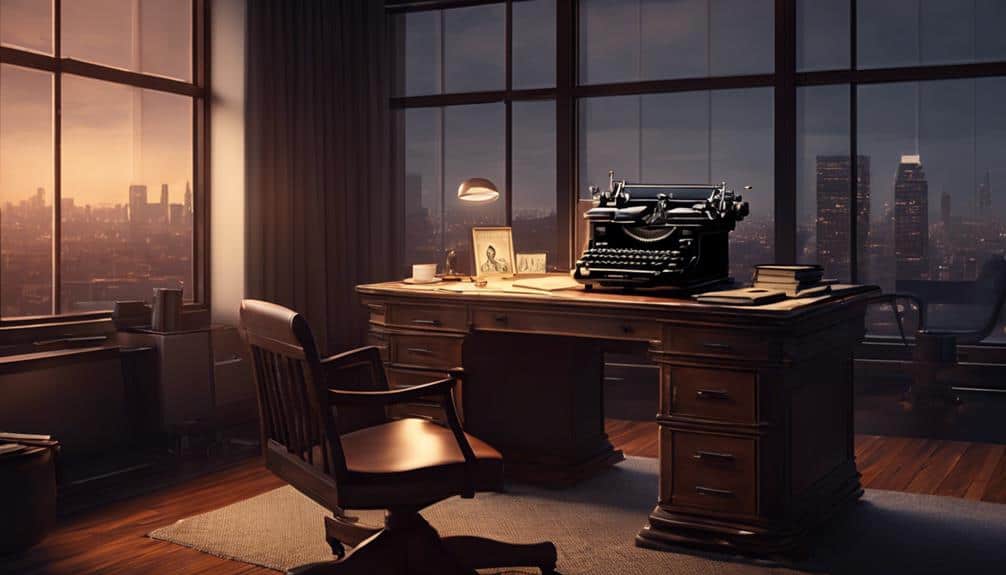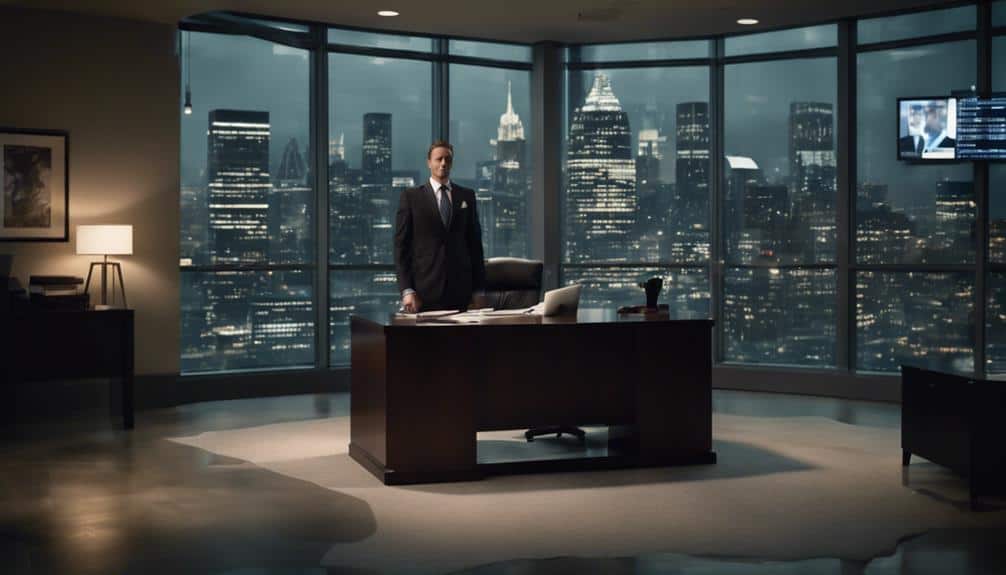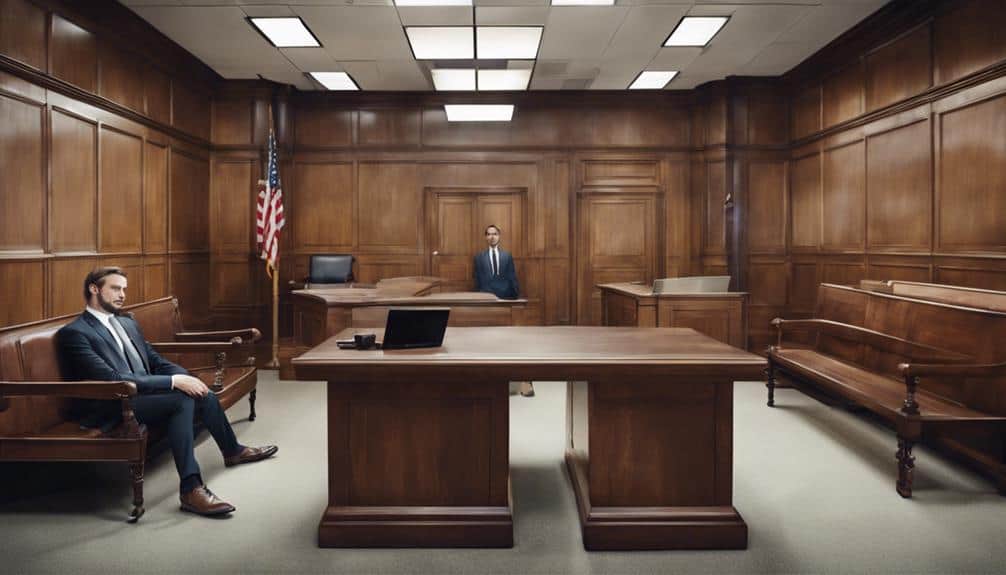As you binge-watch Suits, you're likely wondering how much of the show's portrayal of lawyers, law firms, and courtroom dramas is based on reality. While the show takes creative liberties, it surprisingly captures the high-stress environment, internal politics, and diverse personalities of real lawyers. However, it exaggerates case loads, court proceedings, and luxurious lifestyles. The show's portrayal of building client relationships, office hierarchies, and handling ethical dilemmas is relatively realistic. But where does the line between fact and fiction blur? You'll soon discover that the truth is more complex than you thought, and there's more to uncover.
Key Takeaways
• While Suits portrays a fast-paced and intense legal environment, real legal cases often take months or years to resolve, not just a single episode.
• The show's depiction of luxurious lifestyles and high salaries is exaggerated, and real lawyers typically specialize in one area of law.
• Creative liberties are taken with technology's impact on legal research, and real lawyers rely more on modern technology than traditional research methods.
• The show's blend of litigators and transactional lawyers is unconventional, and real law firms typically have a more traditional structure.
• While Suits accurately portrays the importance of trust, effective communication, and professionalism in lawyer-client interactions, it amplifies drama and tension for entertainment value.
Unraveling the Legal Profession
As you explore the world of 'Suits', you're immediately immersed in the fast-paced and often cutthroat environment of a top-tier law firm, where the show's charismatic characters navigate the intricate web of legal complexities and office politics. The portrayal of the legal profession in 'Suits' is remarkably realistic, showcasing the daily challenges faced by lawyers as they tackle high-stakes cases and negotiate complex deals. The show doesn't shy away from addressing important legal topics like ethics and corporate law, encouraging modern and innovative approaches in law firms.
The portrayal of lawyers in 'Suits' is both glamorous and realistic, striking a balance between the two. This balance sparks conversations about the legal profession, influencing viewers' perceptions of lawyering. A study found that viewers' perceptions of lawyering were influenced by the portrayal of legal professionals in 'Suits.' The show highlights the significance of teamwork and mentorship in legal practice, inspiring real-life lawyers to adopt the style and demeanor of its characters.
Courtroom Drama Vs Reality

While the show's portrayal of lawyers and their daily challenges is remarkably realistic, the courtroom drama in 'Suits' often unfolds in a way that's more sensationalized than realistic. You might find yourself on the edge of your seat as Harvey Specter and Mike Ross navigate high-stakes cases, but in reality, legal proceedings are far more methodical and procedural.
Here are a few key differences between the courtroom drama in 'Suits' and reality:
- Intense negotiations are rare: In reality, lawyers often spend hours, even days, negotiating settlements. In 'Suits', these negotiations are condensed into dramatic, rapid-fire exchanges.
- Cases don't get resolved in a single episode: Real legal cases can drag on for months or even years. 'Suits' condenses this timeline for the sake of entertainment.
- Lawyers don't grandstand in court: While lawyers may be passionate about their cases, they don't typically engage in the kind of showy, aggressive behavior you see in 'Suits'.
- The courtroom isn't a battleground: Real courtrooms are more subdued, with lawyers presenting their arguments in a measured, structured way.
Overcoming Ethical Dilemmas

In the world of Suits, ethical dilemmas are a constant companion to the lawyers, forcing them to navigate the gray areas between moral obligation and legal duty. You'll notice that characters like Harvey Specter often find themselves torn between upholding ethical standards and winning cases. The show masterfully portrays the complexities of practicing law with integrity, highlighting the importance of professional conduct in the legal profession.
As you watch, you'll see lawyers grappling with moral quandaries, such as conflicts of interest and confidentiality breaches. These dilemmas raise important questions about the role of lawyers in society and the moral implications of their actions. The show doesn't shy away from exploring the nuances of ethical decision-making, revealing the inner struggles of lawyers as they balance their legal obligations with their moral compass.
Through its portrayal of ethical dilemmas, Suits sheds light on the realities of the legal profession. You'll gain insight into the moral gray areas that lawyers often face, and the importance of upholding ethical standards in the face of adversity. By exploring these complexities, Suits provides a thought-provoking commentary on the legal profession, encouraging you to think critically about the role of lawyers in society.
Real Lawyers Vs Fictional Characters

You might wonder how the lawyers of Suits, with their sleek suits and quick wit, stack up against their real-life counterparts in top law firms. The answer lies in the nuances of their portrayals. While the show's characters are certainly entertaining, they don't always reflect the realities of being a real lawyer.
Here are a few key differences:
- Real lawyers in top law firms typically specialize in one area of law, unlike the show's characters who jump between litigation and transactional work.
- The luxurious lifestyles and high salaries of senior partners in Suits are reminiscent of real-life examples in the legal profession.
- The show takes creative liberties with the impact of technology on legal research and practice, unlike real-world advancements.
- The internal politics, power struggles, and diverse personalities of lawyers in Suits are realistically portrayed, enhancing the show's authenticity.
In reality, being a lawyer is hard work that requires dedication and perseverance. While Suits may take some creative liberties, it accurately showcases the high-stress environment that lawyers often face.
The show's characters may not be entirely realistic, but they do capture the essence of what it means to be a lawyer. So, the next time you're watching Suits, remember that while the characters may be fictional, the world they inhabit is rooted in reality.
Timeframes and Case Load

Timeframes and case loads in Suits are dramatically condensed to keep the show's fast-paced rhythm, but this creative liberty distorts the reality of legal proceedings. As you watch the show, you might think that lawyers can resolve complex legal cases in a matter of days or weeks. However, in reality, legal cases can take months or even years to resolve. The show's expedited pace is necessary for entertainment value, but it's far from a realistic portrayal of legal practice.
The show also exaggerates the case load of lawyers, showcasing a wide range of cases from criminal to corporate law. You might see Harvey Specter handling multiple cases simultaneously, which is more common in TV dramas than in real life. In reality, lawyers typically focus on a few cases at a time, not an extensive caseload. The show's portrayal of lawyers managing multiple cases simultaneously isn't reflective of typical legal practice.
While the show's creators took creative liberties to keep the show engaging, it's essential to remember that legal cases are complex and time-consuming. In reality, lawyers spend countless hours researching, preparing, and arguing cases, which can't be condensed into a 45-minute episode.
As you enjoy the show, keep in mind that the timeframes and case loads are fictionalized for entertainment value, rather than a realistic portrayal of legal practice.
Unconventional Law Firm Practices

While watching Suits, you might assume that law firms typically blend litigators and transactional lawyers, but in reality, these specialties often operate separately within a firm. The show's portrayal of a mixed practice is quite unconventional, deviating from the traditional structure of real-world law firms. This blend of specialties allows for interesting conflicts and dynamics, but it's not representative of how law firms typically operate.
Here are a few more ways Suits deviates from reality:
- Research methods: The show emphasizes traditional research methods, like digging through law books in a library, rather than leveraging modern technology and online resources.
- Diversity: Suits showcases a more diverse range of characters, including women and people of color in leadership positions, which isn't always reflected in traditional law firm hierarchies.
- Administrative aspects: The show downplays the administrative aspects of running a law firm, like billing and marketing, and focuses on the lawyers and their cases.
- Unconventional practices: The characters in Suits often engage in unconventional practices, like bending the rules or taking risks, which wouldn't be tolerated in real-world law firms.
These creative liberties allow for engaging storylines and character development, but they also distort the reality of working in a law firm. As you watch Suits, keep in mind that the show's portrayal of law firm practices is more fantasy than reality.
Building Client Relationships

In the fast-paced world of Suits, exploring client relationships is an essential aspect of a lawyer's job, and the show effectively highlights the importance of trust, effective communication, and tailored legal advice in fostering strong bonds with clients.
As you watch the characters navigate complex legal cases, you'll notice that they prioritize understanding clients' goals and tailoring their legal advice to meet those needs. This personalized approach helps build trust and credibility, which are essential components of successful client relationships.
You'll also notice that the lawyers in Suits are skilled communicators who can distill complex legal concepts into actionable advice. This effective communication is key to building trust and ensuring that clients feel heard and understood. Additionally, the show emphasizes the importance of professionalism, trust, and ethical conduct in lawyer-client interactions.
You'll see characters like Harvey Specter demonstrating active listening and charisma in developing strong client relationships.
As you explore further into the world of Suits, you'll realize that client relationships are built on more than just legal expertise. They require a deep understanding of clients' goals, ethical considerations, and a commitment to professionalism. By showcasing these essential skills, Suits provides a realistic portrayal of what it takes to build strong, lasting client relationships in the legal profession.
Managing Office Hierarchy

As you explore the world of Suits, you'll notice that the office hierarchy is a well-oiled machine, where each role is clearly defined and responsibilities are distributed according to experience and expertise. This structured approach guarantees that tasks are delegated efficiently, and everyone knows their place within the organization.
The office hierarchy in Suits is characterized by:
- Senior partners overseeing operations and making critical decisions
- Junior partners and associates handling tasks like legal research, document drafting, and case support
- Support staff such as paralegals and legal secretaries providing administrative assistance
- Mentorship relationships between experienced lawyers and younger associates, guiding and mentoring them in the workplace
In this hierarchical structure, task delegation is key. Senior partners delegate tasks to junior partners and associates, who in turn delegate tasks to support staff. This clear division of labor enables the law firm to function smoothly and efficiently.
The office hierarchy in Suits is a demonstration of the importance of effective task delegation and mentorship relationships in a fast-paced legal environment. By exploring the office hierarchy, you'll gain a deeper understanding of how a successful law firm operates.
Blurring the Lines of Reality

As you explore the blurred lines of reality in Suits, you'll notice that the show takes creative liberties with law firm hierarchies, legal case realism, and the courtroom setting.
You might wonder how accurately the show portrays these aspects of the legal profession. Let's examine these points to separate fact from fiction.
Law Firm Hierarchies
You step into the world of Pearson Hardman, and you're immediately immersed in a hierarchical structure that mirrors the real-world law firm experience, where senior partners hold the reins and junior associates hustle to prove themselves. This hierarchy is a key aspect of law firm life, and Suits gets it right.
Here are some ways the show accurately portrays law firm hierarchies:
- Senior partners oversee operations and manage client relationships, while junior partners and associates handle legal research and case support.
- Support staff like paralegals and legal secretaries play an essential role in administrative assistance.
- The show highlights the division of roles and responsibilities based on experience and expertise.
- Workplace dynamics in Suits depict competitive pressures among associates, mentorship relationships, teamwork, and dedication as key elements of professional success in a law firm setting.
Legal Case Realism
Beyond the law firm's internal dynamics, Suits also excels in its portrayal of legal cases, where the writers' attention to detail and commitment to realism blur the lines between fiction and reality.
You get to witness legal cases involving patent laws and expert witnesses, adding a layer of authenticity to the show. As you watch, you'll gain insights into strategic planning, evidence analysis, and complex legal research that lawyers undertake to build their cases.
The series strikes a balance between real-world legal scenarios and creative storytelling liberties, making the narratives engaging and believable. You'll see lawyers maneuvering intricate legal cases with thorough research and courtroom strategies, showcasing the complexities of handling legal cases realistically.
The show's portrayal of legal cases is so realistic that you'll find yourself drawn into the world of corporate law, keen to learn more about the intricacies of the legal profession.
TV Vs. Real Courts
While Suits masterfully weaves intricate legal cases, its portrayal of courtroom interactions often strays from reality, blurring the lines between TV drama and real legal proceedings. As you watch the show, you might assume that the courtroom battles are an accurate representation of real courts. However, this is far from the truth.
Here are a few ways the show takes creative liberties with courtroom practices:
- The show's depiction of attorneys' behavior towards judges is unrealistic and wouldn't be tolerated in real courts.
- Legal jargon and objections in Suits are often incorrect, straying from the reality of courtroom practices.
- Harvey Specter's bluffing skills would lead to serious repercussions in reality, showcasing the fiction vs. reality aspect of legal dramas.
- The show's fast-paced dialogue and plot are enhanced by taking creative liberties, diverging from the authentic legal environment.
Can the Behavior of Narcissists in “Suits” be Applied to Real Life?
In the TV show “Suits,” the behavior of narcissists can be applied to real life, especially when it comes to understanding how to make a narcissist obsessed. The characters exhibit traits such as arrogance, manipulation, and a desire for control, which reflect common behaviors of narcissists in real life.
Separating Fact From Fiction

When you explore the world of 'Suits', it's important to acknowledge that the show's creators intentionally fused reality with fiction to create an engaging narrative. As you delve deeper, it becomes vital to separate fact from fiction, distinguishing between the legal world's realities and the show's dramatized portrayal.
In 'Suits', law firms are depicted as high-stakes, fast-paced environments where lawyers engage in intense legal work. While this mirrors some aspects of real legal practices, the show takes creative liberties to amplify drama and tension. For instance, the characteristics of lawyers on the show, like Harvey Specter's exceptional memory or Louis Litt's eccentricities, are exaggerated for entertainment value. Real cases are often used as inspiration, but the show's writers take liberties to fit the narrative.
The legal system, including courtroom procedures and legal secretaries, is also stylized for dramatic effect. While the show's portrayal of law firms and legal work might be entertaining, it's important to remember that 'Suits' is a work of fictional storytelling, not a documentary on real legal practices.
Frequently Asked Questions
How Accurate Is Suits to Real Life?
As you wonder how accurate Suits is to real life, let's break it down. You'll notice the show gets some things right, like the luxurious lifestyles and high salaries of lawyers.
You'll also recognize the hard work, dedication, and internal politics that come with the job. However, it's not all accurate – the show glosses over technology's impact on legal research and misrepresents managing partners.
How Far Is Suits From Reality?
As you explore the world of 'Suits', you're left wondering, how far is this high-stakes legal drama from reality? Imagine a lavish mansion, where the lines between reality and fantasy blur. That's 'Suits' in a nutshell.
While it captures the glamour and politics of law firms perfectly, it falls short on the accuracy of lawyer roles, tech's impact, and leadership dynamics.
Which Law Show Is Most Accurate?
You're probably wondering which law show is most accurate. Well, according to legal professionals, 'The Good Wife' takes the cake.
It's praised for its attention to legal details, realistic courtroom proceedings, and authentic portrayal of legal cases, client interactions, and ethical considerations.
Experts recommend it for its nuanced storytelling and accurate representation of lawyers' professional challenges and the justice system.
If you want a realistic glimpse into the legal world, 'The Good Wife' is the way to go.
What Is Harvey Specter's Salary?
Imagine yourself walking into a sleek, high-rise office, surrounded by luxury and sophistication. You're about to find out how the other half lives.
Harvey Specter, the suave and confident lawyer from 'Suits', takes home a staggering $1 million per year. That's right, you're talking seven figures!
His salary is a reflection of the lucrative world of top corporate lawyers, where the rewards are as lavish as the lifestyle.
Conclusion
As you peel back the layers of Suits, the line between reality and TV magic starts to blur. While the show takes creative liberties, it surprisingly gets a lot right – from the cutthroat office politics to the high-stakes courtroom battles.
So, the next time you find yourself hooked on Harvey's antics, remember: beneath the polished suits and witty banter lies a world of complex characters, moral gray areas, and the genuine struggles of being a lawyer.


